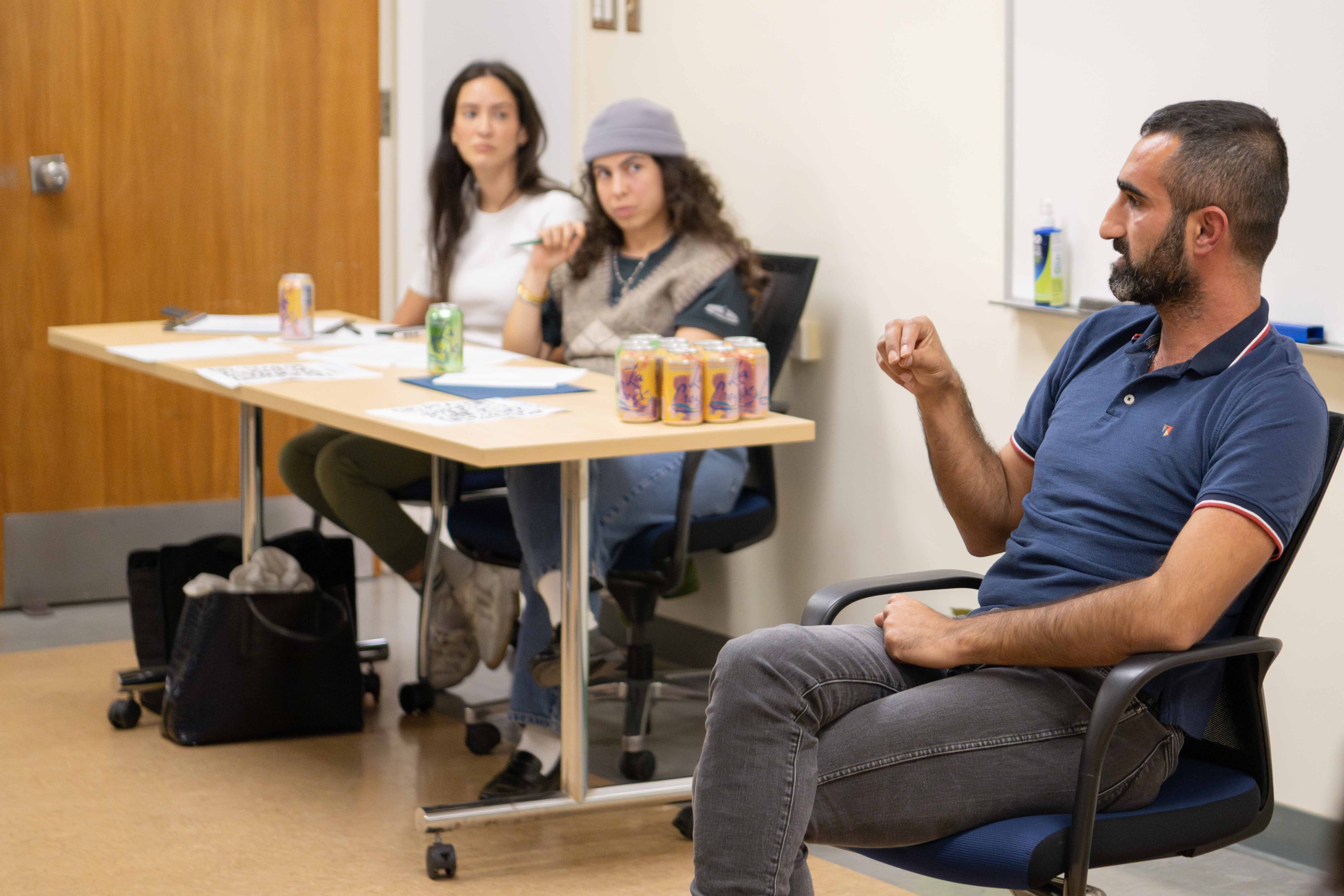Hamze Awawde discusses creating peace, processing trauma of Israel-Hamas war
Hamze Awawde gives a talk at Bunche Hall. The Palestinian peace activist spoke Tuesday about the urgency for peace in the Israel-Hamas war and what college students can do to affect change in the region. (Sam Mulick/Daily Bruin senior staff)
By Sam Mulick
Oct. 20, 2024 11:32 p.m.
This post was updated Oct. 21 at 12:28 a.m.
Hamze Awawde, a Palestinian peace activist, spoke about the Israel-Hamas war Tuesday in Bunche Hall.
About 40 people attended the talk hosted by both Standing Together LA – a coalition of Jews and Muslims advocating for peace – and David Myers, the Sady and Ludwig Kahn Chair in Jewish History and chair of the Dialogue Across Differences Committee. During the talk, Awawde answered questions from the audience on how college students can affect change in the Middle East and how to persevere through the trauma caused by the war.
Awawde said during the talk that as someone who grew up in Palestine, the most important thing is to bring peace to the region no matter how it is achieved. He added that it is important to shift blame from individual people to governmental structures and ideologies based on inequality and violence.
“It’s in the interest of every Jew and Palestinian that this war stops,” Awawde said during the talk. “This is getting bloodier everyday. It’s getting more dangerous every day, and enough with just rallies and flags and slogans because this will not bring a cup of water to Gaza or save another person.”
Awawde added that the only way to combat the generational trauma that the war has created is by permanently stopping the fighting – not just with another ceasefire. Americans have a direct role to play in creating peace by pressuring their government and making economic choices that align with their values, he said.
Awawde also said it is urgent for people on both sides of the conflict to see humanity in each other.
“I don’t think closing doors is what we need. We need the opposite,” he said. “Change depends on having this conversation and bringing these people closer to a vision.”

In response to an audience question about how to deal with trauma, Awade said it has been difficult for him since he knew people who died on both sides of the conflict since Oct. 7, 2023. He added that he tries to cope with his trauma by going to therapy and surrounding himself with people who are consistent in their values.
Awawde said in an interview that it was amazing seeing how deeply college students cared about the ongoing war in Gaza during last spring’s campus protests and hopes that future protests will focus on the people on the ground who are affected. He added that protesters on both sides would be more powerful in coming together to advocate for peace.
“Embarrass the politicians who are not doing anything, who abandoned everyone,” Awawde said. “Embarrass them together because it’s more powerful when they embarrass them together.”
Everyone has something they can contribute, Awawde added, whether it be sponsoring victims of violence or organizing within their community to help those affected by the war.
Adnan Jaber, a lecturer in Design Media Arts who also spoke at the event, said in an interview that it was powerful to hear Awawde advocate for peace.
“It’s really important today, more than ever, to talk about peace and to have people from the ground to come and talk about peacebuilding,” he said. “He’s a Palestinian from the West Bank being able to come here and being able to talk about peace and unity during these hardest times.”
Mikey Aboutboul, who helped organize the event as the president of the Students for Standing Together club at UCLA – a part of Standing Together LA – said it was important for Awawde to talk on campus because his message brought a focus of building peace coalitions toward a sustainable future.
Aboutboul, a fourth-year ethnomusicology and Middle Eastern studies student, added that the event shifted the focus from conflict and extremism to pragmatic solutions for people who are suffering.
Liv Berg, a UCLA alumnus who also attended the event, said she believed the event challenged people to take direct action in bringing about peace.
“I found that it’s very uplifting to be in a space where humanizing the other and promoting peace is actually not just encouraged but proved to be the most pragmatic path,” she said.
Yarin Hagay Nevel, a fourth-year psychology student and president of J Street U at UCLA – an organization advocating for peace between Israelis and Palestinians – said it was powerful to hear someone recognize humanity on both sides of the conflict. She added that the event brought focus back to people on the ground who are directly affected.
Cecelia Fischer, a fourth-year history student, said Awawde’s message emphasized the direct actions Americans can take with their tax dollars and economic choices, adding that the talk did not leave her feeling more hopeful but still changed her perspective.
“I would say, not so much as increasing my hope, but rather bringing me back to a center that is grounded in the organizing principles of human dignity,” she said.
Jaber added that Awawde’s message stuck out from other discourse on the subject.
“His message doesn’t invite polarization. His message invites unity – bringing people together to cease fire and release the hostages together,” he said. “He has empathy for everybody, and that’s the voice we’re missing here a lot.”
